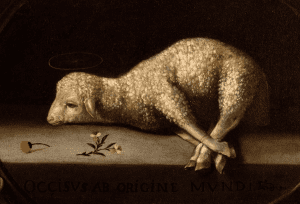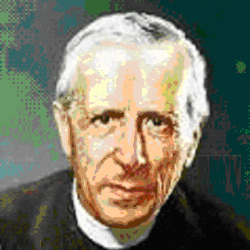
The proclivity to reduce the other to his or her most undesirable characteristics can quickly become outright scapegoating, and what is scapegoating? It is the movement of responsibility and blame solidly onto a target, the destruction of whom will spell liberation from the original tension. This thought about scapegoating brings Christ to mind for two reasons.
First, Christ made himself the terminal—the absolute—scapegoat. All that is wrong with the world has been reconciled ultimately in his self-sacrifice (professed by Christians when they utter “Lamb of God”)—there is no one to blame anymore. I’m reminded of the story of GK Chesterton—the historicity of which is in question—but I nevertheless love the little story and hope it’s true: A newspaper in London posed the question, “What is wrong with the world?” and of all the letters people wrote in, Chesterton’s was the most memorable and most succinct. They asked, “What is wrong with the world?” and he responded, “Dear Sirs, I am. Sincerely yours, G.K. Chesterton.” There is no one any longer upon whom to foist blame. You must move into a mystical perspective of things to capture what’s being conveyed here: all blame, all guilt, all wrongdoing has been taken up on the cross and is no longer ours to condemn and destroy. I understood this truth years ago on retreat with Fr. Richard Rohr, who said, quite definitively and several times: “Everything is radically okay.” Why does he say this? Because all that’s wrong with the world at its root has been absolved on the cross; we now only have to resolve the issues with which we’re confronted, and while we do so, we can maintain hope that the deepest root of the issues at hand has been reconciled.
The second reason Christ comes to mind is because of an observation made by the non-Christian Marxist philosopher Slavoj Žižek who said that if you imagine Christ’s crucifixion as the actual death of God himself—if you put belief in the Trinity and the Resurrection on hold for a minute—and really reflect on this notion that God didn’t die with Nietzsche’s famous words but died on the cross itself, you find yourself not thinking atheistically but living in an nontheistic universe—a universe without God, and then you might imagine that in such a universe there can be no goodness and no hope, and you realize that you’re at a crossroads—either there is no God, no goodness, no hope, or goodness and hope begin with you alone—there is no longer any God or higher power that you can expect to somehow bail you and the world out if it gets bad enough. Rather, the initiative to transform the world can only come from you, and paradoxically, God’s death is what made this into an existential imperative. The theologians in the room might accuse Žižek of Pelagianism, but the point isn’t to split hairs over doctrine—the point is that the transformation of the world has its basis now solidly in the heart and will of each person.
So how do we overcome our inclination to demonize and scapegoat the other? A few years ago Rabbi Shelley Waldenberg connected me with a program called Bridges that was hosted by a synagogue in San Francisco, and it brought together young Muslim and Jewish people, mostly of high school age. I was invited to share with them about Christianity, and Catholicism in particular, and during our discussion I was struck by the Muslim girls, who were around fifteen years old, for two reasons. On the one hand they seemed foreign, even exotic. I occasionally see women in the Bay Area wearing the hijab—and I don’t think much of it—but to sit down and speak with a group of young women, wearing the hijab, and truthfully looking quite elegant, I was impressed. They were composed, and a couple of them gently rocked from side to side while we spoke. But on the other hand, they didn’t seem exotic at all—in speech, in humor, and even fiddling with their phones—they were no different from the fifteen-years-olds I teach every day, and when I left the synagogue that night I felt good having made that connection, meeting people—smiling with people. The notion of Muslims seemed that much less a notion and more just people, like meeting anyone else.
A hero in my own intellectual hall-of-fame is the German Jewish philosopher Martin Buber. One of my favorite quotations of Buber’s (of which there are many), is “All real living is meeting.” When we watch the news, listen to the news, read the news, we are being informed, but we are not meeting the other. When we watch YouTube videos, read Internet commentaries, and click through links to other sources of information, we are being informed, but we are not meeting the other. Continually soaking our minds in news, commentary, and online media does not do nearly enough to deepen and transform our perceptions of the world, which, for all mortal beings, are admittedly woefully narrow.
The work of Tikkun Olam, transforming the world, must begin within the heart of each individual person, and for each person at some point this entails confronting and being prepared to let go of aspects of who and what we are. Years ago I served as research assistant to Jesuit Fr. Jim Voiss at St. Louis University, and one of my tasks was to pour through every single work of well-known theologian Bernard Lonergan looking for instances of the phrase “affect-laden image.” All of us have in our minds and hearts a multitude of images that arouse in us strong feelings and emotions—this is what we mean by affect-laden image, but it’s important to recognize that just because we value something, doesn’t mean that what we value is truly good. Imagine a person who for years, maybe decades, enjoys Sunday afternoons sitting on a park bench feeding bread bits to birds. Ornithologists in the area determine that the migratory patterns of some of the birds in the park are being disrupted by the food people feed them, so a sign goes up prohibiting feeding the birds. It might come as a disappointment to someone who’s fed the birds for so long that an otherwise harmless activity, laden with positive affect, has been taken away. It’s only the bad guys of fiction who sense that they’re evil; most of the evil in the real world is committed by people who think they’re engaged in good.
Our perception of reality and ourselves is shaped throughout our lives by personal and cultural images and narratives that we must always be ready to let go of in the interest of bettering the world. We must exercise the willingness to surrender things that bring us pleasure if those things are ultimately contrary to the Good. We must work for a future that we will not live to see. Are we willing to honor future life the way we might honor God?












